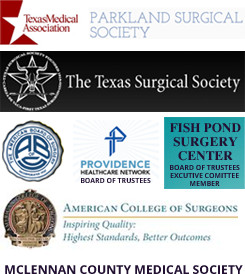Hernia Post-Op
Inguinal Hernia Surgery Post Op Instructions
These post-operative instructions are provided for our patients’ convenience.
Wound care
If you have a large white gauze dressing covering your wounds, this may be removed the day following surgery. Underneath will be small steri-strips. These should be left alone. These steri-strips usually fall off by themselves within two weeks following surgery. Do not attempt to remove any staples or sutures that are in place until you return to see the doctor. You may reapply a bandage if drainage continues, or if you simply prefer to wear one. You may gently shower the day after surgery. Try not to remove the white steri-strips. You may take a tub bath 7 days after surgery.
Diet
Following your surgery you should gradually increase your dietary intake. Begin with a bland type of diet, such as chicken noodle soup and crackers, Gatorade or tea, and gradually work your way up to normal diet.
Activity
When you first get home from the hospital it is important that you get up and move around the house. When first getting up from the lying down position, go slowly. It is important to sit on the side of the bed for 3 to 4 minutes to let your body adjust. At night, do not get up quickly and walk to the bathroom. This is to avoid the rare occasion when (due to pain medication and anesthesia) people become faint due to quickly arising from a lying down position. For the first week following your surgery you should avoid any strenuous physical activity. Walking short distances and going up and down stairs is acceptable. Do not drive for at least 5 days after surgery. You should not drive if you have taken any prescription pain medication within the past 24 hours. During the second week, you may walk for exercise. Do not lift anything heavier than 10 lbs. for at least 4-6 weeks following surgery. Usually following the 4 week period, you may gradually increase your activities using common sense and as comfort dictates. However, you should avoid any physical activity that might make your incision sore, such as lifting heavy objects, moving furniture, lifting weights, etc.
Medication
You should resume all your home medications with the exception of aspirin or other anticoagulants. Aspirin and other anticoagulants should be discontinued for at least a week following surgery, unless other arrangements have been made with your doctor.
Follow Up Visit
Normally the hospital or surgery center will set up your follow up appointment, if not please feel free to call our office. We usually like to see you 3 weeks after your surgery. Please do not leave the Waco area for 1 week following your surgery. That way, should you have any problems, you are close to your surgeon.
Pain Control
For your comfort, you may wish to hold a pillow to your abdomen when you cough, get up from a sitting position, or do any other activity that strains the abdomen. Apply an ice pack for 30 minute periods as needed for pain or swelling during the first two days following surgery. Please use the prescription for pain medication given to you at the time of discharge. Be sure to take narcotic pain medication with food so as not to upset your stomach. Should you experience nausea during the post-operative period, this is usually related to the pain medication and can be treated by stopping the pain medication. You can gradually taper this over to plain Tylenol. If you have had no past problems with ulcer disease or gastrointestinal bleeding or allergies to aspirin, you can use Ibuprofen. Do not drive while you are taking a prescription pain medication.
Swelling
It is not unusual to notice, two to three days following surgery, some swelling of the scrotum and possibly bruising of the penis and testicles. This is normal and does resolve within several days to a week. Women may similarly note swelling and bruising of the labia on the affected side.
Bowel Movement
It is not uncommon for patients who have had anesthesia and who are on pain medication to become constipated. This should be treated with gradually increasing your activity and drinking a normal amount of water to maintain hydration. A high fiber diet or dietary fiber supplements will also help. In addition, Ducolax suppositories or Fleet enemas may be obtained at the drug store without a prescription and can be used once or twice per day as needed. Alternatively, a dose of Milk of Magnesia also may be used.
Special Attention
Should you experience a temperature over 101 degrees or have persistent nausea or vomiting or other problems that you think need medical attention, please call us at the office. If you have any questions or problems, during normal business hours 8:00am-5:00pm, please call Dr Todd A. Moffatt’s office at (254) 230-1234. If you are having a problem after hours, please call our office and press 2 to leave a message. Someone will return your call promptly.

